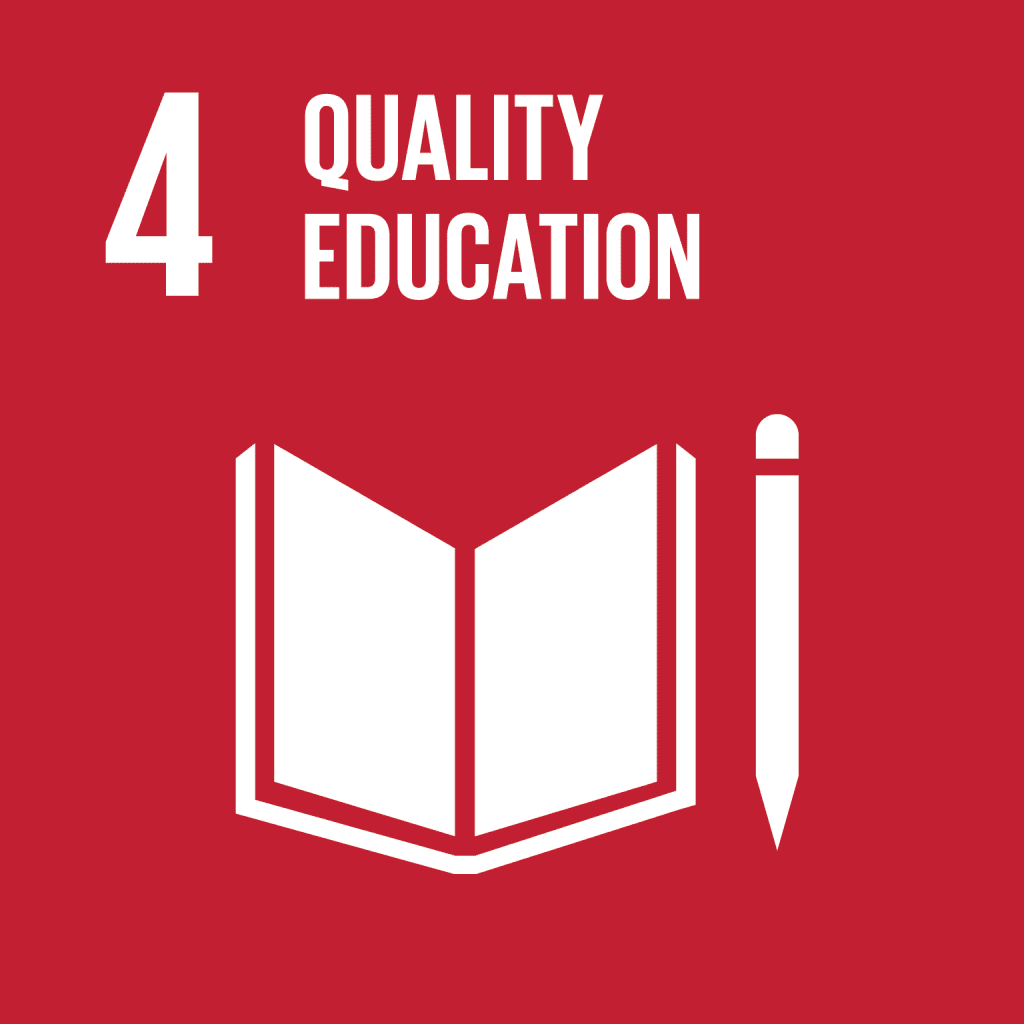Sustainability Skills Survey 2023-24: Key Findings
The Sustainability Skills Survey 2023-24, conducted with 12,551 UK students, including 463 from the University of Worcester, revealed insightful trends about student perspectives on sustainability, education, and future employment. Many respondents believe their courses will equip them with the skills to improve people’s health and quality of life.
Factors in Choosing a Place to Study The survey highlighted various factors influencing the choice of study place. Proximity to home (43%), seriousness about environmental issues (12%), and employment prospects after completing the course (66%) were among the top factors. The primary reasons for taking the course included gaining qualifications (23%), improving earning potential (37%), and challenging oneself (55%). These are perhaps not very surprising findings.

Factors for Job Application A chance to work in a business/organization that makes a difference in social and environmental issues (39%) and a good starting salary (48%) were among the top factors for job application.
It was very interesting to see students reporting their courses covered a wide range of skills and knowledge, including understanding how human activity is affecting nature (53%), the causes of inequality in the world (60%), and considering ethical issues linked to the subject (48%).
Most respondents found it extremely relevant to build the material into the existing content in the course (37%) and link coursework, projects, or dissertations to the issues (41%). This is very interesting for the University which is looking at how it can embed even more opportunities to do this across all subjects.
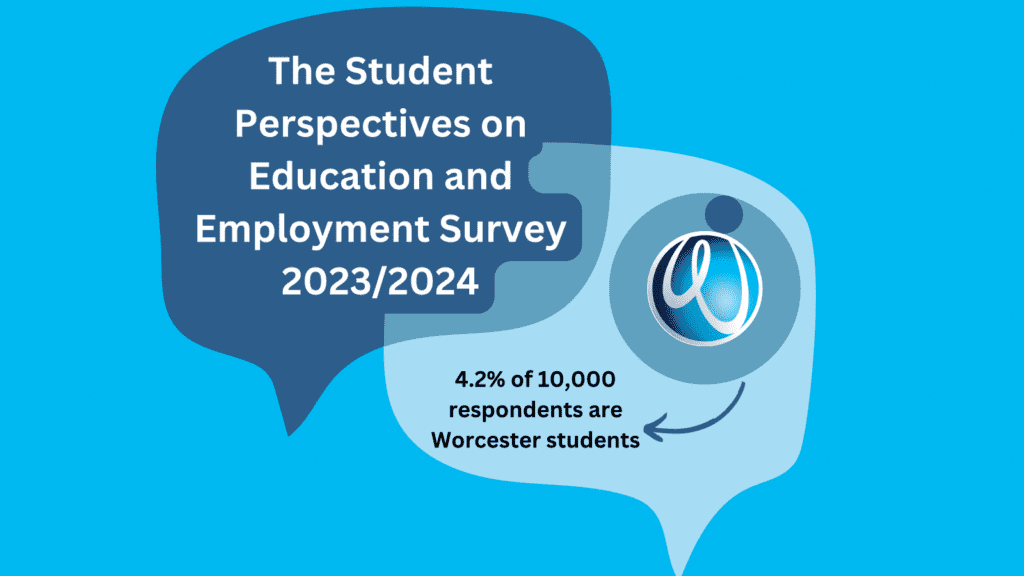
Unsurprisingly considering the above findings students reported case studies were found to be very helpful by 55% of respondents, while experiential project work was found to be very helpful by 40% of respondents. Skills such as understanding how human activity is affecting nature (30%), considering ethical issues linked to the subject (63%), and communicating complex information clearly and effectively to different types of people (72%) were considered very important by respondents. Most students strongly agree (49%) or agree (32%) that places of study/apprenticeships should be obliged to develop students’/apprentices’ social and environmental skills as part of their courses.
Institution’s Impact on Environment and Society Most students agree (47%) or strongly agree (27%) that their place of study takes action to limit the negative impact it has on the environment and society. A majority of respondents have learned what climate change is and how it happens through their education (83%). These are consistent findings from these longitudinal studies.
Interestingly Colonialism Education A significant number of respondents have learned perspectives from cultures around the world (81%) and perspectives from groups underrepresented in our society (73%). The University is investing resources into ensuring all areas of its curriculum is decolonised.
Environmental Impact and Encouragement Most respondents believe that their university education acted the most to reduce its negative impact on the environment and society (40%).
These findings provide valuable insights into the current trends and perspectives of UK students regarding sustainability, education, and future employment. They highlight the importance of integrating sustainability and environmental consciousness into education and future job roles.
Sustainability Skills Survey in 2022-23: Worcester Students Given a Voice. Written by Sian Evans and Rosie Bramwell. Graphics by Fay Askew.
According to a recent Sustainability Skills Survey, there is more to choosing which University to attend than just the campus and various courses it has to offer. At the start of the 2022/2023 academic year, NUS hosted a Sustainability Skills Survey. Worcester University had the fifth highest number of responses across the country, with 421 students getting involved. This survey is a chance to review the appeal of the University, and the progress being made towards helping the environment and its students. With a mixture of responses from students in different years, it is an opportunity to improve and choose the next steps for the future. Of the responses, 55% were first years, 22% second years and 23% were in their third or subsequent year. This post highlights some of the key findings from the survey.
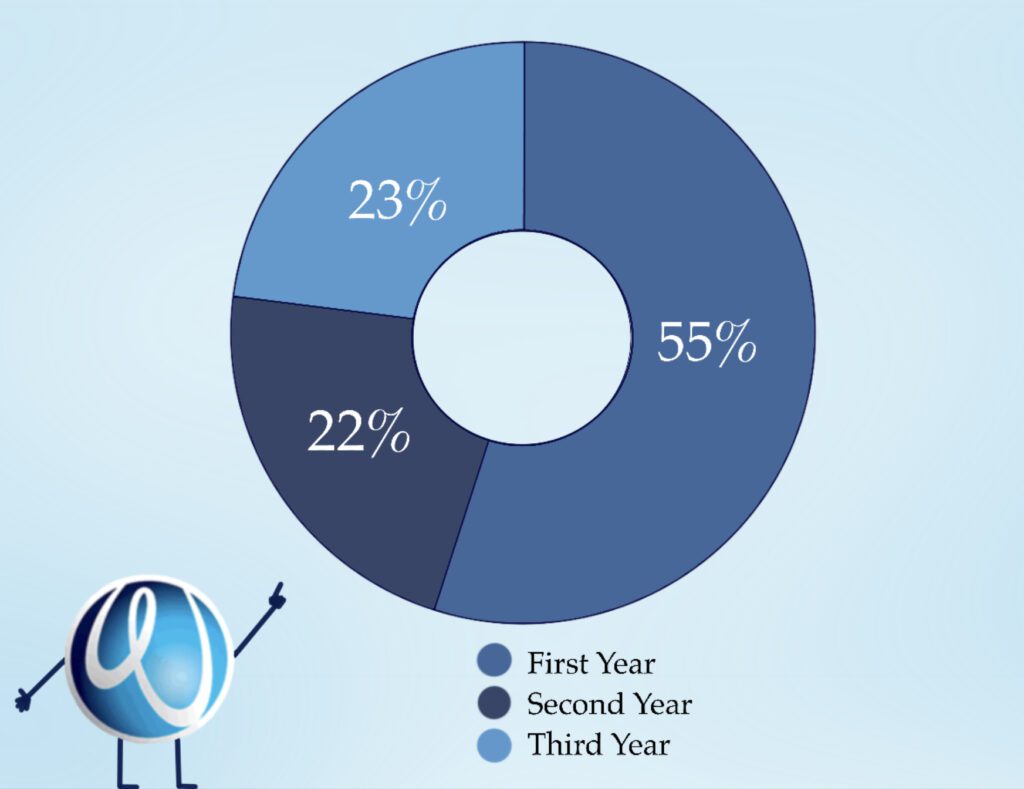
What the survey said students found important (when choosing Worcester University)
Looking at what influenced students to choose Worcester, can help the University attract more students in the future. 59% stated “employment prospects” as the most important factor for choosing Worcester. Knowing the opportunities and success rates of previous students is encouraging and reassuring to newer students.
65% chose “attractiveness of location” as somewhat or very important, suggesting that the appearance of the University and its campuses is a significant factor alongside the courses and capabilities.
55% noted the main reason for choosing their course was “to gain qualifications”, as well as 40% choosing Worcester to “improve my ability to make a difference to other people.” This suggests that location and appearance of the University is influential enough for some students over the success and employment rates of the course.
This compares to only 28% choosing Worcester for “how seriously it takes environmental issues” as a somewhat important factor. 26% for “how seriously the place of study takes global development issues.” Students seem particularly keen to see ethical issues addressed and evidently care about the impact and influence the University has for environmental and global changes.
How Important Is…
Students on the survey were asked to rate nine phrases on their importance, marking them on a scale between ‘very important’ to ‘not at all important’. The phrases looked specifically at inequality, resources, challenges, ethics, the environment, and the local community. The results show clear indications of the students’ opinions, with many of the options having low numbers for ‘don’t know’.
The study found that many students identified learning sustainability skills, attributes and knowledge as being valuable. For example, 65% placed importance on ‘understanding how human activity is affecting nature’, 82% on understanding the ‘causes of inequality in the world’, and 77% on using resources efficiently to ‘limit the impact on environment and people’.
Students were particularly keen to see ethical issues addressed with 89% placing importance on ‘considering ethical issues’ linked to their subject and 76% wanting to understand problems ‘from the perspective of people from around the world’.
The survey also identified the continued importance to many students(83%) of knowing how to challenge the way things are done (e.g., in business, politics and education), particularly to learn and understand how to create change (rising from 85% last year to 88% this year).
Comparison of Pay and Ethics
“Assuming all other factors are equal, would you rather?”
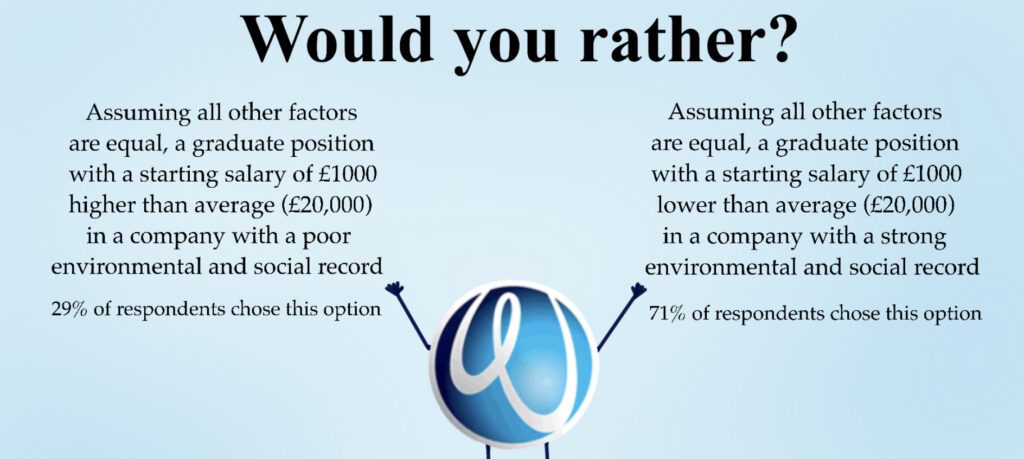
When given the option of a £1000 lower than average salary, 71% of respondents opted for this if the company had a strong environmental and social record, assuming that all other factors were equal. This compares to 29% choosing £1000 higher in poorer conditions. This suggests that students care more for a comfortable and reliable workplace, over a high salary after leaving University.
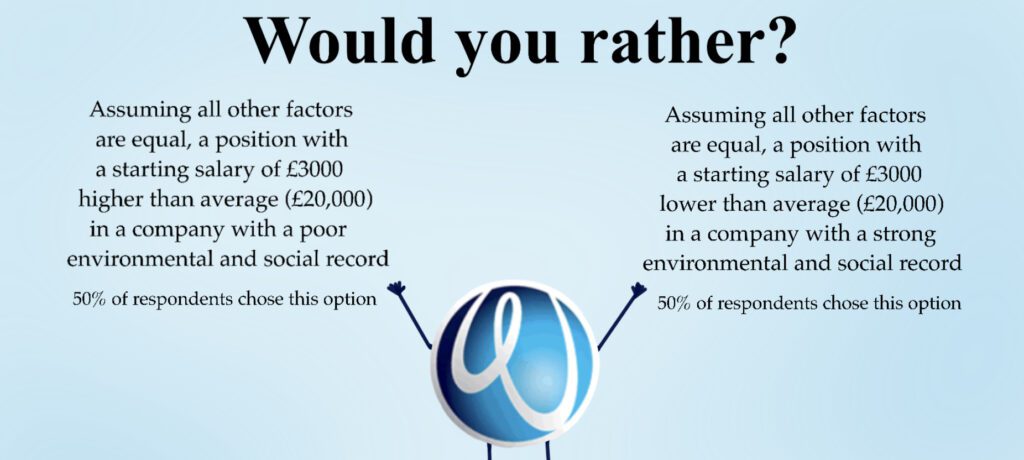
When that £1000 changes to £3000, the balance shifts significantly. Assuming all other factors are equal, 50% of respondents said they’d choose the higher salary in poor conditions. The 50/50 split would suggest that although students would prefer a reliable workplace over a higher salary. If that salary change is noticeably higher, they would rather opt for the money.
To what extent do you agree?
Respondents were asked to what extent they agreed with social/environmental skills, impacts, and actions taken by the University and the Students’ Union. Rating between ‘strongly agree’ and ‘strongly disagree’, many responses suggested that Worcester University is actively working towards improving its environmental and social impact.
What is Sustainable development?
According to respondents’ current knowledge, it refers to the changes made to have less of a negative impact on the environment. There is an understanding that some things have negative impacts and we can adapt to use things that are less damaging. For example, moving away from fossil fuels and using solar panels as an energy source. It’s arguably a realist approach, where progress should be based on sustainable efforts and work towards future social and environmental goals. To summarise: we need to grow in a way that doesn’t harm the environment.
Why would students like to learn more about sustainable development?
Despite this, respondents admitted to not knowing enough about sustainable development. They would like to learn more to ensure confidence in discussions and incorporate it into their studies. In the long run, it is vital for the benefit of the planet and the human race. Some respondents admitted to feeling unsure of its meaning and feeling powerless regarding the future. Education promoting sustainable development can show everyone how they can play their part and do just a little bit more.
Similar to last year, students strongly emphasise the relevance of placements and work experience in gaining sustainability skills (up 2% to 82%). Linking coursework, projects or dissertations to sustainability skills was also popular (78%). Many felt it should be built into the curriculum or as a standalone module, with 79% agreeing that sustainable development ‘is something which all courses in places of study/apprenticeships should actively incorporate and promote’.
Students generally felt like their educational experiences to date had given them an understanding of ‘what climate change is and how it happens’ (84%) but slightly less on ‘What we can do at local and global levels to lessen climate change’ (80%) and ‘What our daily lives will look like as a result of climate change’ (70%).
According to the survey, what actions would students like to see at Worcester?
Responses were taken directly from the survey:
- More one-off volunteering opportunities for those who can’t commit to a continuous role.
- Specific sustainable development workshops to engage students, as I feel many do not know its significance. If not workshops, perhaps promotional videos or talks from individuals/groups engaged in sustainable development.
- I would like them to make new students more aware of what they can do to be helping.
- Engage with social media more.
- Perhaps have more societies and groups to involve everyone and make everyone aware.
- I would like to see a wider range of disposal units that are available for students to sort their waste into on campus (cardboard, food, cans and plastic recycling).
- To reduce any unwanted spending and to implement methods that are sustainable.
The majority of students recognise the increasing value that employers are placing on recruiting graduates with a range of sustainability skills. Graduates are also increasingly questioning the sustainability credentials of future employers. The survey identified that 39% of students said it was very important to them to get ‘a chance to work in a business/organisation that makes a difference to social and environmental issues, 28% said it was very important to get a role that ‘contributes to helping the environment’ and 40% a role that ‘contributes to development in the local community’.
What impact, if any, has learning about any of the issues in the previous question had on students personally?
Responses take directly from the survey:
- Learning about climate change has helped me to understand how I can do my bit.
- It has made me more aware of my surroundings and helped me think about preserving it.
- Opens your eyes to the inequalities and problems that surface in the world.
- I consider a lot of these factors during my studying now.
- Unsure.
If you would like to read the full survey for 2022- 23 it’s available here
Next steps for Worcester University after this survey
“The Worcester Students’ Union will continue to commit to being a sustainable business, as well as offering tools to students to also feel confident to be able to deal with different sustainable issues.
We will do this by taking on feedback from students, by creating and promoting volunteering opportunities as well as supporting campaigns and events that our student body is interested in.
We will also work with the Networks, particularly the Sustainability Network to bring together students and ideas to champion the work of Students to ensure that our work as an SU is student-led.”

Take a look at a previous Student and Staff survey and our SDGs in the Institution post to see how the University of Worcester has changed things for the better!
